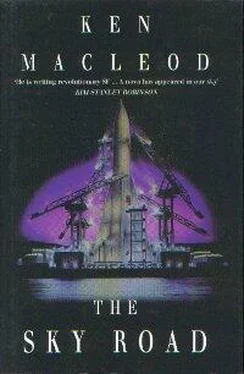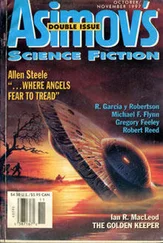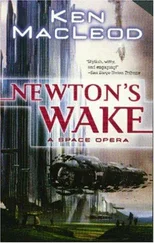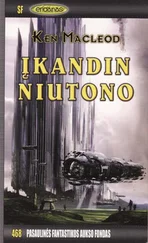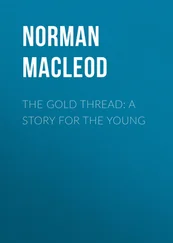Ken Macleod - The Sky Road
Здесь есть возможность читать онлайн «Ken Macleod - The Sky Road» весь текст электронной книги совершенно бесплатно (целиком полную версию без сокращений). В некоторых случаях можно слушать аудио, скачать через торрент в формате fb2 и присутствует краткое содержание. Год выпуска: 1999, ISBN: 1999, Издательство: Orbit, Жанр: Фантастика и фэнтези, на английском языке. Описание произведения, (предисловие) а так же отзывы посетителей доступны на портале библиотеки ЛибКат.
- Название:The Sky Road
- Автор:
- Издательство:Orbit
- Жанр:
- Год:1999
- ISBN:1-85723-755-2
- Рейтинг книги:3 / 5. Голосов: 1
-
Избранное:Добавить в избранное
- Отзывы:
-
Ваша оценка:
- 60
- 1
- 2
- 3
- 4
- 5
The Sky Road: краткое содержание, описание и аннотация
Предлагаем к чтению аннотацию, описание, краткое содержание или предисловие (зависит от того, что написал сам автор книги «The Sky Road»). Если вы не нашли необходимую информацию о книге — напишите в комментариях, мы постараемся отыскать её.
The Sky Road — читать онлайн бесплатно полную книгу (весь текст) целиком
Ниже представлен текст книги, разбитый по страницам. Система сохранения места последней прочитанной страницы, позволяет с удобством читать онлайн бесплатно книгу «The Sky Road», без необходимости каждый раз заново искать на чём Вы остановились. Поставьте закладку, и сможете в любой момент перейти на страницу, на которой закончили чтение.
Интервал:
Закладка:
Our contract for the month was to finish that structure. There was no flexibility in the contract: there was only a month to go before the platform was floated out. Angus Grizzlyback, the foreman, was sitting at a wooden pallet mounted on crates to form a table, on which were spread some disassembled welding-torches, a small tin of kerosene and a few now very dirty seagull quills. He stood and glowered at us, reflexively lowering his head so as not to bash his pate on the next level up. You could see the white hairs on his chest and forearms which had inspired his nickname (or, for all I know, his surname, local custom being what it was). He was nearly two metres tall and about a hundred and fifty years old.
“Ah, good afternoon, gentlemen,” he said. “I trust you all enjoyed your long lie? Let’s see if we can think of something to occupy our leisure for the rest of the day.”
He drew a sheaf of finger-marked papers from his pocket as we gathered around the pallet. His pale grey eyes, under white brows, fixed me for a second.
“ And you can get started right away, colha Gree,” he added.
I nodded brightly, winced at the effect of this sudden violent motion, and went off to make the tea.
The morning meeting—twenty minutes of sitting around, drinking tea and smoking—was the routine start to the day. Work on the project was organised through a sort of ecological pyramid of contractors and sub-contractors, from the great kraken of the International Scientific Society all the way down to frantically scrabbling krill like myself. Angus Grizzlyback combined the functions of entrepreneur and foreman, which partly cut across, and pardy complemented, the job of the shop steward (in our case, Jondo) who held the equivalent position in the parallel pyramid of the union.
Conversation at the meeting, in my two months’ experience, revolved around rumour, the day’s news and sport. At the end of it everybody would drain their mugs, fold their newspapers, stub out their cigarettes, glance at some scrap of paper or doodle of slopped tea, nod to Angus and get cracking on some complex job to which only the most recondite allusion had been made. I would clear up the mess, rinse out the mugs if we were near a tap, and listen to Angus spell out my task for the day in terms suitable for the simple-minded.
Today’s agenda was dominated by a motion before the Strathcarron district council, reported in the West Highland Free Press, that the locality should delegate its coinage to the regional council at In-verfefforan. This dangerous proposal for centralisation found no favour around the pallet. It was forensically dissected by Angus, vulgarly derided by the Lewismen, angrily dismissed by the Carronich. I myself pointed out a recent lesson of history. A few years earlier, a similar proposal had been passed in Strathclyde. The Glasgow mark had lost all public confidence, and the scheme was abandoned when annual inflation reached a ruinous two per cent. The discussion moved on to the national football league, and my attention wandered.
You can guess where. This time, however, my thoughts were more rational, and troubling, than my previous delighted memories, eager anticipations and fond fantasies. High as my opinion was of myself, I could not shake off my impression that Menial had expected to find me; that she had known me, or known of me; that her first glance had signified recognition. Love and lust at that sight there had been, on both sides I was sure; but I was equally, though more obscurely, sure that this was not the first sight. I had recognised her too, but had no idea from where; with her it was conscious from the beginning, unconcealed but unexplained.
For a moment—I admit with shame—I considered the notion that we might have known each other in a previous life, whatever that may mean. On an instant I dismissed the idea as the foolish, womanish, oriental superstition that it is. Metempsychosis (though undoubtedly within the power of Omnipotence) has no place in the natural and rational religion.
So I lounged, elbows on the rough wood of the crude table, and sipped tea and smoked leaf while my companions argued about finance or football, and tried to apply my infinitesimal portion of Reason to a problem on which my passions were fully, and turbulently, engaged. The rational conclusion was that if we recognised each other we must have met before, not in an imagined previous life, but previously in this.
There were a number of possibilities on my side of the equation. (Menial’s I set aside—there were any number of ways in which she, from her privileged vantage, could have observed me, unobserved herself, and investigated me, undetected.) Was it conceivable that one of the hundreds of faces I saw nearly every day had been hers, unnoticed at the time? It seemed unlikely: hers was the kind of face I couldn’t help but notice. I’d have given her a second look, and more, in a crowd of thousands.
Had I seen her, then, in another context, perhaps not even in the flesh? In, for example, some poster or moving picture about the project (all of which, for understandable reasons of recruitment, lied about its complement of pretty girls)? The same objections applied—I’d remember the film, I’d have the poster.
By further elimination I quickly returned to the first explanation that had struck me: that we had met, or at least seen each other, in our earlier years; in childhood. Menial, I now recalled with renewed interest, had not explicitly disavowed the possibility—only discounted it, saying that she wasn’t from around here.
Neither, of course, was I. There was no reason why I couldn’t have seen her. I couldn’t remember any such encounter, but I already knew that our childhood memories are as vagrant as our childhood selves, and as elusive; and as capable of innocent, shameless deceit.
The brute-force approach suggested itself: interrogate my parents, brothers and sisters; ransack family photographs… not yet. Already, the conscious thought that I sought the memory would have released the insensible agency in my mind that I privately thought of as the Librarian. That part of me would do the rest, and bring back the record if it were to be found at all—no doubt at some time as unexpected as it would be inopportune, but welcome nonetheless.
“—the torch parts?” said Angus.
I realised I had missed something. Angus sighed.
“You understand how to fit them, test and adjust?”
“Sure,” I said, nodding with more confidence than I felt.
Tine, fine,” said Angus, standing up and briskly brushing the palms of his hands together. “Let’s get on with it, gendemen.”
The others were grinning at me.
“Some night that must have been,” said Murdo Too, setting off another round of ribald teasing. I took it in good part but was relieved when they’d all clambered away into the support structure, leaving me to get on with my job without benefit of Angus’s unheard instructions. A couple of hours passed quite pleasantly, if dangerously, and at the morning tea-break Angus was happy enough with the results to turn me loose on some sheet metal a dozen metres inward and ten up. I perched in the din-filled open space of the support structure, with nothing visible while I worked but what my own torch’s jet illuminated, and with little else on my mind.
About twelve o’clock I decided to knock off for lunch. I throttled down the torch and lifted my mask. As I gathered up the bits of kit to carry back I heard Menial’s voice. I blinked and looked down. There she was, looking up from under a safety-helmet.
“Hi, Clovis!” she shouted, waving a lunch-box.
I waved back and returned to the scaffolding, dropped my tools and grabbed my lunch-box and descended to the dock’s floor so quickly that my boots made the stairwell ring. By the time I’d reached the bottom, Merrial had walked over and was waiting for me. She was wearing the standard boiler-suit and boots, an outfit which—with her tied-back hair—gave her a boyish look. Her hug and kiss of greeting were sweet and warm; the rims of our helmets clanged, and we pulled apart, laughing.
Читать дальшеИнтервал:
Закладка:
Похожие книги на «The Sky Road»
Представляем Вашему вниманию похожие книги на «The Sky Road» списком для выбора. Мы отобрали схожую по названию и смыслу литературу в надежде предоставить читателям больше вариантов отыскать новые, интересные, ещё непрочитанные произведения.
Обсуждение, отзывы о книге «The Sky Road» и просто собственные мнения читателей. Оставьте ваши комментарии, напишите, что Вы думаете о произведении, его смысле или главных героях. Укажите что конкретно понравилось, а что нет, и почему Вы так считаете.
